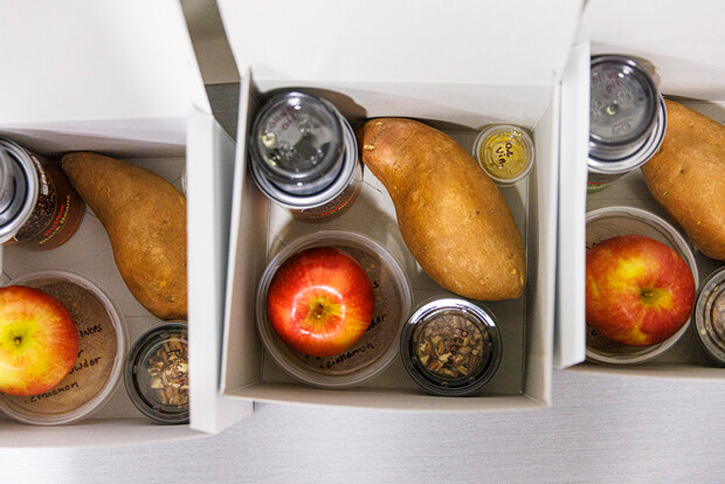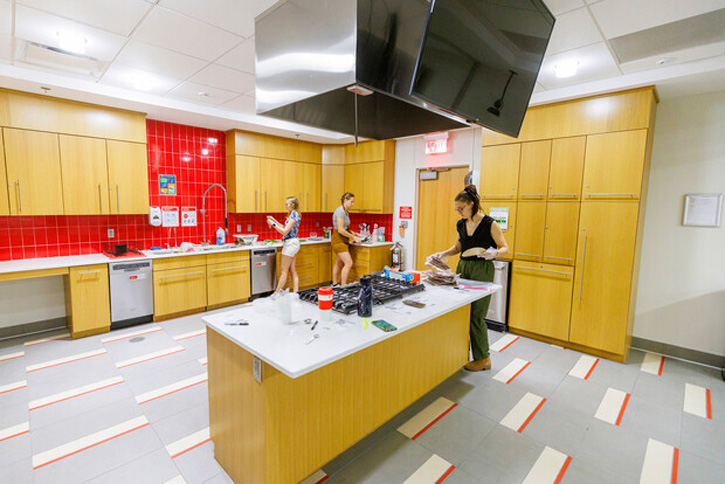Despite a brief pause due to the COVID-19 pandemic, Meal Kit Mondays at the University of Nebraska-Lincoln (UNL) are now seeing an overwhelming response from students who want a balanced and affordable prepared meal.
The program first began in 2018 when a Campus Rec employee conceptualized the idea after seeing the success of other meal kit services like Hello Fresh and Blue Apron.
Now, Meal Kit Mondays are approved by dietician Brenna Schmader, the coordinator of Nutrition Education, and prepared by Campus Rec Wellness and Nutrition Education students.
“The intention behind Meal Kit Mondays is to provide affordable, quick and healthy meals to our campus community: students, faculty and staff,” said Schmader. “It is a great opportunity for these students to find, adapt and make recipes come to life. It’s also an opportunity to teach them about nutrition, program promotion and management.”
Program Details and Process
UNL’s Rec and Wellness Center offers the ready-to-go Meal Kit Mondays through its Wellness Kitchen on East Campus. The service offers everything needed to prepare dinner in less than an hour.
All kits include a recipe card to assist with preparation. Participants provide utensils, cooking spray, minor chopping, mixing and baking to complete each meal which costs $15 and serves four.

Schmader said they have a budget for each Monday in the program, then they factor in cost of labor and other supplies like containers, boxes and plastic bags. The cost per serving is $3.75 which she said is comparably much more affordable than other meal kit services running at about $9 per serving. Originally, the initiative only provided meal kits once a month. That number is now up to twice a month since it grew in popularity.
EXTRA CREDIT: Read about the University of California, Riverside’s Cooking Well program here.
“Making Meal Kit Mondays a reality is not as hard as it may seem,” said Schmader. “Students collected and adapted a handful of recipes. The team decided to offer three recipes on each Monday — two meat-based and one plant-based — to offer enough variety for people to choose from, but not so much variety that our staff or customers are overwhelmed with the number of selections.”
Once recipes are adapted, the team then creates recipe cards, grocery lists and cost on each recipe to track expenditures versus income. Once orders are placed, they count how many meal kits of each kind are ordered and go shopping.
“When we receive a large volume of orders, we source our groceries from food distribution companies and wholesale vendors,” said Schmader. “When preparing the kits, we put out boxes, put the ingredients into appropriate containers and add a recipe card. From there, customers come pick up the meal kits at the Wellness Kitchen.”
Food Choices and Whole Body Health
Each meal’s two meat-based options and one plant-based option help accommodate for dietary habits and preferences. Kits offer around three to four food groups since they are geared more toward dinners and include protein, dairy, vegetables and grains.
Schmader said recipes are balanced, colorful, nutritious and tasty. They also like to include culturally diverse recipes and food items that some people may not be familiar with to help diversify palates. For example, she said they offer a coconut chickpea curry, and other recipes may include water chestnuts and bok choy.

“So not only are customers exposed to a variety of foods, but they are also learning how to cook balanced meals,” said Schmader. “We also give customers the option to include notes about dietary preferences and allergies.”
Schmader added the hope for the program is to show how easy and enjoyable eating balanced meals can be as eating healthy sometimes is a struggle for busy students and professionals.
Campus Reaction and Final Advice
At first, Schmader said many people on campus did not realize the program was still being offered when the pandemic began to settle down. But after taking advantage of some publicity opportunities, order numbers skyrocketed.
EXTRA CREDIT: Professionals report the impact COVID-19 has had on campus rec.
“We continue to conduct surveys to garner feedback and recommendations for improvement,” said Schmader. “Within many of these surveys and through verbal affirmation from customers, they say Meal Kit Mondays make their weeks so much easier, the meals are delicious and they feel good eating balanced meals.”
For other campus rec departments considering starting their own nutrition program, Schmader advised to consider creating a position for a registered dietitian due to their breadth of nutrition knowledge and related skills. At UNL, she hopes Meal Kit Mondays continue to grow as they are currently working on a six-month recipe cycle.
“Previously and currently, we are finding and adapting all recipes from scratch,” said Schmader. “With our numerous nutrition education offerings, we have a plethora of recipes, therefore, we are selecting the most successful recipes to be included in this cycle. This will make the program much more self-sufficient while still offering plenty of variety for regular users.”










